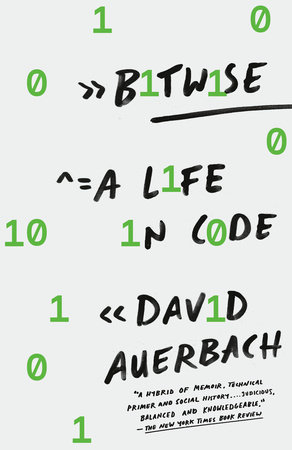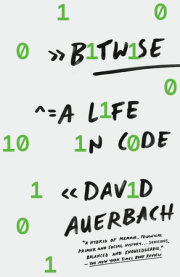INTRODUCTIONThoughtfulness means: not everything is as obvious as it used to be.
—Hans BlumenbergComputers always offered me a world that made sense. As a child, I sought refuge in computers as a safe, contemplative realm far from the world. People confused me. Computers were precise and comprehensible. On the one hand, the underspecified and elusive world of human beings; on the other, the regimented world of code.
I had tried to make sense of the real world, but couldn’t. Many programmers can. They navigate relationships, research politics, and engage with works of art as analytically and surgically as they do code. But I could not determine the algorithms that ran the human world. Programming computers from a young age taught me to organize thoughts, break down problems, and build systems. But I couldn’t find any algorithms sufficient to capture the complexities of human psychology and sociology.
Computer algorithms are sets of exact instructions. Imagine describing how to perform a task precisely, whether it’s cooking or dancing or assembling furniture, and you’ll quickly realize how much is left implicit and how many details we all take for granted without giving it a second thought. Computers don’t possess that knowledge, yet computer systems today have evolved imperfect pictures of ourselves and our world. There is a gap between those pictures and reality. The smaller the gap, the more useful computers become to us. A self-driving car that can only distinguish between empty space and solid objects operates using a primitive image of the world. A car that can distinguish between human and nonhuman objects possesses a more sophisticated picture, which makes it better able to avoid deadly errors. As the gap closes, we can better trust computers to
know our world. Computers can even trick us into thinking the gap is smaller than it really is. This book is about that gap, how it is closing, and how
we are changing as it closes. Computers mark the latest stage of the industrial revolution, the next relocation of our experience from the natural world to an artificial and man-made one. This computed world is as different from the “real” world as the factory town is from the rural landscape.
Above all, this book is the story of my own attempt to close that gap. I was born into a world where the personal computer did not yet exist. By the time I was old enough to program, it did, and I embraced technology. In college, I gained access to the internet and the nascent “World Wide Web,” back in the days when AOL was better known than the internet itself. I studied literature, philosophy, and computer science, but only the latter field offered a secure future. So after college I took a job as a software engineer at Microsoft before moving to Google’s then-tiny New York office. I took graduate classes in literature and philosophy on the side, and I continued to write, even as the internet ballooned and our lives gradually transitioned to being online all the time. As a coder and a writer, I always kept a foot in each world. For years, I did not understand how they could possibly converge. But neither made sense in isolation. I studied the humanities to understand logic and programming, and I studied the sciences to understand language and literature.
A “bitwise operator” is a computer instruction that operates on a sequence of bits (a sequence of 1s and 0s, “bit” being short for “binary digit”), manipulating the individual bits of data rather than whatever those bits might represent (which could be anything). To look at something bitwise is to say, “I don’t care what it means, just crunch the data.” But I also think of it as signifying an understanding of the hidden layers of data structures and algorithms beneath the surface of the worldly data that computers store. It’s not enough to be worldwise if computers are representing the world. We must be bitwise as well—and be able to translate our ideas between the two realms.
This book traces an outward path—outward from myself and my own history, to the social realm of human psychology, and then to human populations and their digital lives. Computers and the internet have flattened our local, regional, and global communities. Technology shapes our politics: in my lifetime, we have gone from Ronald Reagan, the movie star president, to Donald Trump, the tweeting president. We are bombarded with worldwide news that informs our daily lives. We form virtual groups with people halfway around the world, and these groups coordinate and act in real time. Our mechanisms of reason and emotion cannot process all this information in a systematic and rational way. We evolved as mostly nomadic creatures living in small communities, not urban-dwelling residents connected in a loose but extensive mesh to every other being on the planet. It’s nothing short of astounding that the human mind copes with this drastic change in living. But we don’t think quite right for our world today, and we are attempting to off-load that work to computers, to mixed results.
Computers paradoxically both mitigate and amplify our own limitations. They give us the tools to gain a greater perspective on the world. Yet if we feed them our prejudices, computers will happily recite those prejudices back to us in quantitative and apparently objective form. Computers can’t know us—not yet, anyway—but we think they do. We see ourselves differently in their reflections.
We are also, in philosopher Hans Blumenberg’s term, “creatures of deficiency.” We are cursed to be aware of our poverty of understanding and the gaps between our constructions of the world and the world itself, but we can learn to constrain and quantify our lack of understanding. Computers may either help us understand the gaps in our knowledge of the world and ourselves, or they may exacerbate those gaps so thoroughly that we forget that they are even there. Today they do both.
Copyright © 2018 by David Auerbach. All rights reserved. No part of this excerpt may be reproduced or reprinted without permission in writing from the publisher.




